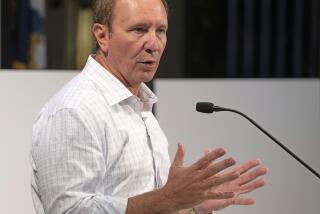Former Louisiana Gov. Edwin Edwards freed from prison
- Share via
Reporting from Crowley, La. — Edwin Edwards — governor, gambler, ladies’ man, human quote machine and convicted felon — is back among his people.
The four-term governor, who did more to define Louisiana’s freewheeling political culture than anyone in the last half century, was released Thursday from federal prison after serving more than eight years for fraud, racketeering and extortion. After checking in at a halfway house in Baton Rouge, he was expected to serve the remaining six months of his sentence in home confinement at a relative’s house.
The silver-haired Democrat was accused of many things over the years. By his count, he was the subject of two dozen investigations, three indictments and four federal trials. But no one ever accused him of a paucity of wit: He once boasted that he would lose an election only if caught “in bed with a dead girl or a live boy,” and he derided an opponent as so slow “it would take him an hour and a half to watch ’60 Minutes.’ ”
Edwards recently told biographer Leo Honeycutt that at age 83, he is “too far from the womb and too close to the tomb” to run for office again. Video of him entering the halfway house Thursday showed a doughier, more fragile man than the one who entered prison in 2002 after falling from grace in a scandal over rigged riverboat casino licenses.
Yet the fact of his freedom still had the power to spook some Louisianans who fret that their fellow voters remain susceptible to their state’s famously flamboyant and often ethically dodgy style of populism, which has been chronicled in literature, song and countless grand jury proceedings.
“He’ll probably be on the ballot in 2012. And don’t be surprised if he wins,” a commentator named “norofthelake” posted Thursday on the website of New Orleans’ Times-Picayune newspaper, adding: “Only in Louisiana.”
Indeed, in Crowley, the agricultural hub of 14,000 that was Edwards’ old base in the heart of Cajun country, many voters said they would be happy if the man they called the “Cajun Prince” would vie for a restoration.
At the least, they will be proud to have him home. Private donations have recently funded the repair of a vandalized Edwards memorial in front of the 1951 art deco Acadia Parish Courthouse. Last week, the local paper reported that he had been invited to serve as grand marshal of Crowley’s 75th International Rice Festival.
“I’d vote for him again,” said Danny Hebert, 57, a Crowley city inspector who fondly recalled the night years ago that a call to Edwards’ brother Marion got him sprung from a drunk-driving arrest upstate. “You had to like him. He didn’t look down on nobody.”
“He took care of the people who took care of him,” said Bradley Zaunbrecher, 44, a rice and crawfish farmer. As for the corruption, Zaunbrecher said, “I don’t know if that’s for real or not.”
Even though Edwards left office 15 years ago, state politics can still feel defined by him — if only by his absence. In recent years, voters have preferred their governors buttermilk bland.
Republican Gov. Bobby Jindal, who took office in 2008, has positioned himself as the consummate anti-Edwards, with a goody-two-shoes demeanor and a speaking style that eschews the tradition of slick Southern stump speakers in favor of caffeinated, accountant-like recitations of fact.
Mark Ballard, capitol editor of the Baton Rouge Advocate, said that when Jindal denounces “the politics of old” — which he does quite a bit — “he’s talking about Edwin Edwards. And everybody knows he’s talking about Edwin Edwards.”
Jindal, a rising star in Republican circles, enjoyed a 77% approval rating shortly after taking office in 2008. But he has seen a drop-off in popularity amid declining state revenue; a poll in November put Jindal’s approval rating at 55%.
Edwards, meanwhile, has been undergoing a reappraisal that ramped up shortly after Hurricane Katrina in 2005, with the emergence of a sentiment voters like Hebert continue to express today.
“Yeah, he might have fattened his pockets,” Hebert said, but Edwards would have gotten things done after the storm. “He wouldn’t have stood up there and cried like [former Gov.] Kathleen Blanco.”
Since its release in late 2009, Honeycutt’s largely favorable “authorized” biography, “Edwin Edwards: Governor of Louisiana,” has sold nearly 50,000 copies. In it, Honeycutt says that Edwards’ 2000 criminal conviction was marred by an overzealous prosecutor and presiding judge. In an epilogue, Edwards argues that he was convicted “by what everyone in the legal profession called dubious means.”
When asked last week whether he thought Edwards was guilty, Honeycutt, over lunch at a Lafayette po’ boy joint, paused, and with a slight smile, replied, “No — at least not what they convicted him for.”
The whiff of scandal marred each of Edwards’ three periods as governor, from 1972-80, then 1984-88 and, finally, 1992-96. But even his critics recognized that it was difficult to accuse him of hypocrisy, given how open he was about his roguish approach to life.
“He’d go straight to their hearts and tell them, ‘I’m broken, I’m a sinner, I’m a bad guy, and here are the things that I do that you’re not going to like,’ ” said pollster Elliott Stonecipher, who worked for one of Edwards’ great rivals, one-term Gov. Buddy Roemer. “The voters would say, ‘Shoot, they’re all liars and thieves — at least he told me.’ ”
It was also impossible to knock Edwards’ Bayou State credentials. He was born outside Marksville on the political and cultural dividing line between Catholic south Louisiana and the Protestant north, and at different times he threw in with both faiths.
A sharecropper’s son who grew up speaking both English and Cajun French, he earned a law degree in Baton Rouge before settling in Crowley, about 150 miles west of New Orleans, where, as a councilman, he paved gravel roads and helped build a modern sewer system.
As governor, he appointed an unprecedented number of blacks and women to important positions, streamlined bloated bureaucracy, oversaw the completion of the Louisiana Superdome, and linked oil severance taxes to price rather than volume — creating a windfall during a time of high oil and gas prices, and allowing the state to spend generously on social programs.
Early on, voters were willing to overlook the womanizing that earned him the nickname the “Silver Zipper,” and a gambling habit that forced him to pay off losses to Las Vegas casinos with suitcases of cash.
By the 1990s, however, repeated scandals seemed to doom him politically. Then, in 1991, former Klansman David Duke emerged as a surprisingly strong gubernatorial candidate. Former foes of Edwards lined up behind him, plastering their bumpers with stickers that read, “Vote for the Crook — It’s Important.”
Through his daughter Anna Edwards, he declined an interview. She said the Cajun Prince was “touched” that he would be asked to be grand marshal of the rice festival in Crowley.
He would accept the invitation, she said, pending the approval of the U.S. Probation Office.
More to Read
Sign up for Essential California
The most important California stories and recommendations in your inbox every morning.
You may occasionally receive promotional content from the Los Angeles Times.












